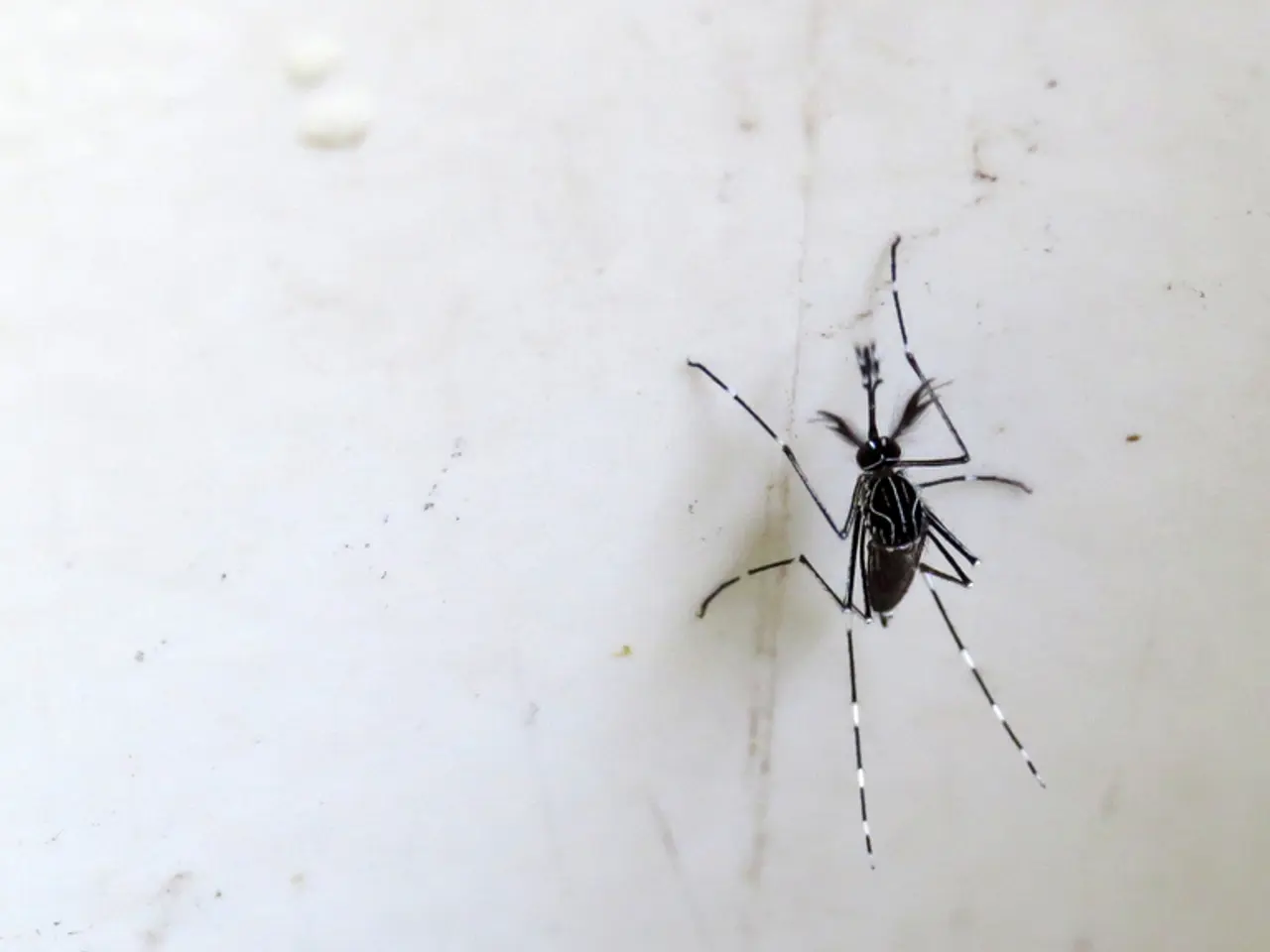Mosquito Species Asian Tiger Remains a Persistent Presence in NRW's Environments - Emphasis in the report is placed on the importance of establishing a unified European health insurance program.
Asian Tiger Mosquito Spreads in North Rhine-Westphalia: What You Need to Know
The Asian Tiger Mosquito, scientifically known as Aedes albopictus, is making its way across North Rhine-Westphalia, and this invasive species poses potential health risks. The mosquito can transmit viruses such as West Nile, dengue, Zika, and chikungunya, which can cause a range of symptoms from fever and joint pain to more severe complications, especially in vulnerable populations.
Health Risks
The chikungunya virus, for instance, causes severe joint pain that can last weeks or even months. Severe cases are rare but more likely in older or chronically ill individuals. The dengue and Zika viruses, also transmitted by the Asian Tiger Mosquito, can cause serious health effects, with Zika being particularly concerning due to its link to birth defects. The West Nile virus is also emerging in Europe, adding to the concerns.
Prevention Measures
Prevention measures in North Rhine-Westphalia (and similar European areas) focus on eliminating mosquito breeding sites, using mosquito repellents, promoting community awareness, monitoring and controlling mosquito populations, and implementing personal protective measures.
Eliminating mosquito breeding sites involves removing standing water from containers such as buckets, flower pots, dish racks, and other places where water can stagnate—even small amounts. Using mosquito repellents on skin and clothing during peak mosquito activity times (early morning and late afternoon) can also help reduce bites.
Promoting community awareness about the mosquito’s breeding habits and active periods encourages preventive actions. Monitoring and controlling mosquito populations around urban and transport areas can limit the spread of the mosquito. Personal protective measures such as wearing long sleeves and using window screens can also help reduce mosquito contact.
With climate change enabling the mosquito to survive in previously unsuitable environments, integrated public health strategies—focused on surveillance, public education, and mosquito habitat control—are critical for minimizing disease risk in North Rhine-Westphalia.
Current Situation in North Rhine-Westphalia
So far, the Asian Tiger Mosquito has settled in a few, locally limited areas in North Rhine-Westphalia, specifically in Bonn, Kerpen, Brühl, and Euskirchen. A specimen was reported in Euskirchen in 2021, but no further findings were made, suggesting an isolated case. No Asian Tiger Mosquito-related pathogen transmission to humans has been reported in North Rhine-Westphalia.
However, the mosquito is expected to spread further in North Rhine-Westphalia in the coming years. Citizens in Kerpen and Brühl are asked to take action to control the Asian Tiger Mosquito population. The Rhein-Erft district has asked citizens in the mosquito hotspots of Kerpen-Bǘrggen and Brühl-Ost to help contain the population by covering rain barrels with fine mesh nets, changing water in paddling pools and birdbaths regularly, and emptying other water containers every few days.
In Cologne, where no Asian Tiger Mosquito has been detected so far, the city administration has asked residents to remain vigilant. The spread is attributed to favorable climatic conditions along the Rhine, international travel, and freight traffic.
Reporting Suspicious Mosquitoes
Suspicious mosquitoes can be sent for identification to the nationwide project "Mosquito Atlas" or emailed to [email protected].
[1] Centers for Disease Control and Prevention. (2021). Asian Tiger Mosquito. Retrieved from https://www.cdc.gov/ticks/asiantiger/index.html
[2] European Centre for Disease Prevention and Control. (2021). Aedes albopictus. Retrieved from https://www.ecdc.europa.eu/en/vector-borne-diseases/insect-vectors/aedes-albopictus
[3] World Health Organization. (2021). Aedes albopictus. Retrieved from https://www.who.int/news-room/fact-sheets/detail/aedes-albopictus
[4] Robert Koch Institute. (2021). Aedes albopictus. Retrieved from https://www.rki.de/DE/Content/Infekt/Virologie/Arboviren/AedesAlbopictus/nachrichten/nachricht_node.html
[5] Bundesgesundheitsblatt Gesundheitsforschung Gesundheitsschutz. (2021). Aedes albopictus: Erste Erkrankung in Nordrhein-Westfalen. Retrieved from https://www.bgbl.de/bgbl/bgbl/en/bgbl2021/bgbl_2021-06-25-I_0001.html
- Adhering to the community policy of controlling mosquito breeding sites and promoting awareness about this invasive species is essential in North Rhine-Westphalia, given the potential health risks associated with environmental protection issues, such as the chikungunya, dengue, Zika, and West Nile viruses.
- In the realm of environmental protection and other aspects of the environment, the scientific understanding of the Asian Tiger Mosquito and its carrying capacity for harmful pathogens like the ones mentioned earlier, is fundamental to employing effective strategies for workplace-wellness, medical-conditions, health-and-wellness, and fitness-and-exercise.
- Skin-care regimens could be influenced by the increased presence of the Asian Tiger Mosquito, due to the prevention measures that involve using mosquito repellents on skin and clothing, making it crucial to prioritize environmental protection in various sectors, including therapies-and-treatments, nutrition, and medicare.
- Climate-change impacts extend beyond the environment to mental-health, as it contributes to the rising prevalence of pests such as the Asian Tiger Mosquito, thereby necessitating a holistic approach to address these issues.
- The emerging situation of the Asian Tiger Mosquito in North Rhine-Westphalia accentuates the importance of environmental-science in investigating and mitigating this environmental protection problem, allowing for the development of landscape-level management practices to combat climate-change effects.
- Given the serious health effects linked to the Asian Tiger Mosquito and the evolution of its presence in Europe, it is vital to maintain a collaborative effort among various agencies and organizations to ensure the well-being of citizens in North Rhine-Westphalia and beyond, concerning environmental protection and overall health-and-wellness.




